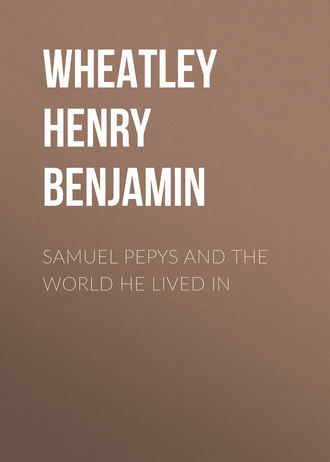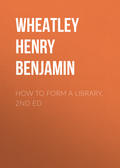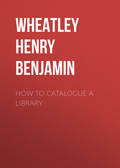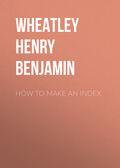
Wheatley Henry Benjamin
Samuel Pepys and the World He Lived In
APPENDIX
APPENDIX I.
PORTRAITS OF SAMUEL PEPYS
PAINTINGS BY
1. Savill (a painter in Cheapside). 1661. See “Diary,” Nov. 23.
Jan. 6, 1661–62: “I sent my lute to the Paynter’s, and there I staid with him all the morning to see him paint the neck of my lute in my picture, which I was not pleased with after it was done.”
Pepys appears to have sat to this same painter for a miniature or “picture in little,” which cost £3. See “Diary,” Feb. 20, 1661–62, June 11, 1662.
Jan. 28, 1661–62: “The Paynter, though a very honest man, I found to be very silly as to matter of skill in shadows, for we were long in discourse, till I was almost angry to hear him talk so simply.”
2. John Hales. 1666.
March 17, 1666: “This day I began to sit, and he will make me, I think, a very fine picture. He promises it shall be as good as my wife’s, and I sit to have it full of shadows, and do almost break my neck looking over my shoulder to make the posture for him to work by.”
March 30, 1666: “To Hales’s, and there sat till almost quite darke upon working my gowne, which I hired to be drawn in: an Indian gown.”
April 11, 1666: “To Hales’s, where there was nothing to be found to be done more to my picture, but the musique, which now pleases me mightily, it being painted true.”
This picture was bought by Peter Cunningham, at the sale of the Pepys Cockerell collection in 1848, and it was purchased by the trustees of the National Portrait Gallery in 1866. The eyes look at the spectator, and the face is turned three-quarters to the left. The music is Pepys’s own song, “Beauty Retire.”
“There is a similar picture belonging to Mr. Hawes, of Kensington, which Mr. Scharf, the Keeper of the National Portrait Gallery, thinks is either a replica or a good old copy.”—Rev. Mynors Bright’s edition of the “Diary,” vol. iii. p. 423 (note).
Walpole mentions Hales in his “Anecdotes of Painting,” and says that he lived in Southampton Street, Bloomsbury, and died there suddenly in 1679.
3. Sir Peter Lely. Pepysian Library, Magdalene College, Cambridge.
4. Sir Godfrey Kneller. Andrew Pepys Cockerell, Esq. This picture was lent to the First Special Exhibition of National Portraits, 1866, and was numbered 950.
5. Sir Godfrey Kneller. The Royal Society.
6. Sir Godfrey Kneller. Hall of Magdalene College, Cambridge.
7. A small portrait attributed to Kneller, representing a seated figure; with a globe in one corner, and a guitar (or lute) and compasses on a table, and a ship in the distance at sea. Mr. Scharf suggests the possibility of this being the portrait by Savill described above (No. 1), and this suggestion seems highly probable. Mrs. Frederick Pepys Cockerell.
8. Anonymous. 1675.
“The picture is beyond praise; but causes admiration in all that see it. Its posture so stately and magnificent, and it hits so naturally your proportion and the noble air of your face, that I remain immovable before it hours together,” &c. T. Hill to Pepys, Lisbon, July 1, 1675.—Smith’s “Life of Pepys,” vol. i. p. 161.
9. The picture by Verrio at Christ’s Hospital, of James II. on his throne receiving the mathematical pupils of the school, contains a portrait of Pepys. The original drawing for the picture by Verrio is in the possession of Andrew Pepys Cockerell, Esq.
ENGRAVINGS BY
1. Robert White. Kneller, painter. Portrait in a carved oval frame, bearing inscription SAM. PEPYS. CAR. ET. JAC. ANGL. REGIB. A. SECRETIS. ADMIRALIÆ. Motto under the frame, “Mens cujusque is est quisque.” Large book-plate.
2. Robert White. Kneller, painter. Portrait in an oval medallion on a scroll of paper. Motto over his head, “Mens cujusque is est quisque;” underneath the same inscription as on No. 1. Small book-plate.
These two engravings are described by Granger.
3. J. Bragg. Kneller, painter. Frontispiece to vol. i. of the first edition of the “Diary,” 1825 (4to.). “From the original in the possession of S. P. Cockerell.” Picture described as No. 7, now in the possession of Mrs. Frederick Pepys Cockerell.
4. J. Bragg. Kneller, painter. Frontispiece to vol. i. of the second edition of the “Diary,” 1828; much worn in the third edition, 1848. “From the original picture in the possession of S. P. Cockerell.” Picture described as No. 4, now in the possession of Andrew Pepys Cockerell, Esq.
5. W. C. Edwards. Kneller, painter. Frontispiece to vol. i. of the fourth edition of the “Diary,” 1854. From the same original as the preceding article.
6. Charles Wass. Walker, painter. In Smith’s “Life, Journals, and Correspondence of Pepys,” vol. i. 1841, said to be in the collection of the Royal Society, but this is a mistake.
PHOTOGRAPHS
1. From the portrait by Kneller (No. 4), series of photographs published by the South Kensington Museum under the superintendence of the Council of the Arundel Society.
2. From Edwards’s engraving of Kneller’s Portrait, “Diary,” ed. Mynors Bright, vol. i. 1875.
3. From Hales’s Portrait (No. 2), “Diary,” ed. Mynors Bright, vol. iii. 1876.
BUST
The following extracts from the “Diary” refer to a bust which was made for Pepys:—
Feb. 10, 1668–69: “So to the plaisterer’s at Charing Cross that casts heads and bodies in plaister: and there I had my whole face done; but I was vexed first to be forced to daub all my face over with pomatum: but it was pretty to feel how soft and easily it is done on the face, and by and by, by degrees how hard it becomes, that you cannot break it, and sits so close, that you cannot pull it off, and yet so easy, that it is as soft as a pillow so safe is everything where many parts of the body do bear alike. Thus was the mould made; but when it came off there was little pleasure in it, as it looks in the mould, nor any resemblance whatever there will be in the figure when I come to see it cast off.”
Feb. 15, 1668–69: “To the plaisterer’s, and there saw the figure of my face taken from the mould: and it is most admirably like, and I will have another made, before I take it away.”
APPENDIX II.
THE SCHEMES OF ALEXANDER MARCHANT, SIEUR DE ST. MICHEL (MRS. PEPYS’S FATHER.)
THE unpractical schemes of Mons. St. Michel are alluded to on pages 7–8 of this book, but the editors of the “Diary” have taken no pains to obtain any information respecting him, and his name even does not appear in the “Diary.” Lord Braybrooke suggests, without any justification for the suggestion, that Mrs. Pepys’s mother had married again (see “Diary,” March 29th, 1667).
Pepys was wrong in the date of the patent, which is numbered 138, and Sir Edward Ford’s name does not appear in it. Sir John Colladon, a Fellow of the Royal College of Physicians, was naturalized by Charles II., and appointed one of the Physicians to the Queen.
St. Michel’s name evidently puzzled the man who drafted the patent. The following is a copy of the original patent:—
“Charles the Second, by the grace of God, &c., to all to whom these p’sents shall come, greeting
“Whereas we are informed that John Colladon, Doctor in Phisicke, and Alexander Marchant, of St. Michall, have, with much paines and charge, found “A way to p’vent and cure the Smoakeing of Chimneys, either by stopping the Tunnell towards the Top, and altering the former Course of the Smoake, or by setting Tunnells With Checke within the Chimneyes;” wch Invenc̃on soe found out as aforesaid was never publickly exercised or made vse of in anie of our kingdomes or dominions: And whereas the said John Colladon and Alexander Marchant have humbly besought vs for their better incouragemt to exercise and put in practice the said Invenc̃on, that wee would be gratiously pleased to graunt vnto them, the said Joh. Colladon and Alexander Marchant, our Lr̃es Patents of Priviledge for the sole vse and benifitt thereof, for the time and terme of fowerteene yeares, according to the statute in that case made and provided.
“Nowe knowe ye, therefore, that we, of our princely inclinac̃on, being willing to incourage and promote works of this nature, and to give all due and fitting incouragemt to the inventers of such arts as may be of publicke vse and benifitt, of our especiall grace, certeine knowledge, and meere moc̃on, and vpon the humble petic̃on of the said John Colladon and Alexander Marchant, have given and graunted, and by these p’sents, for vs, our heyres and successors, doe give and graunt vnto the said John Colladon and Alexander Marchant, their executors, administrators, and assignes, speciall licence, full power, priviledge, and authoritie, that they and every of them, by themselves, their or anie of their deputie or deputies, servants, workmen, or assignes, at all times and from time to time hereafter, dureing the terme of yeares hereafter in these p’sents expressed, shall and lawfully may vse, exercise, imploy, and enioy the said newe Invenc̃on in and throughout all our realmes and dominions, and every or anie of them, in such manner as to them or anie or either of them, in their or anie of their discrec̃ons shall seeme meet, and shall and may have and enioy the sole benifitt and advantage comeing or ariseing by reason thereof, dureing the terme of yeares hereby graunted; and to the end, the said John Colladon and Alexander Marchant, their executors, administrators, and assignes, and every of them, may the better enioy the full and whole benifitt and the sole vse and exercise of the Invenc̃on aforesaid, wee doe by these p’sents, for vs, our heyres and successors, require and streightly cōmaund all and every person and persons, bodyes politicke and corporate, of whatsoever qualitie or degree, name or addic̃on, they be, that neither they nor anie of them, dureing the terme of yeares hereby graunted, either directly or indirectly, doe or shall vse or put in practice the said Invenc̃on, soe by the said John Colladon and Alexander Marchant attained vnto or invented as aforesaid, nor doe or shall counterfeit, imitate, or resemble the same, nor doe or shall make anie addition therevnto, or substracc̃on from the same, whereby to p’tend themselves the inventors or devisors thereof, without the licence, consent, or agreement of the said John Colladon and Alexander Marchant, their executors, administrators, or assignes, in writeing vnder their hands and seales, first had and obteined in that behalfe, vpon such paines and penalties as can or may be inflicted vpon such offendors for their contempt of this our cōmaund in that behalfe, and further to be answerable to the said John Colladon and Alexander Marchant, their executors, and administrators, and assignes, according to lawe and justice, for their damages thereby susteined; to have and to hold all the said licences, powers, privileges, and authorities hereby graunted as aforesaid vnto them, the said John Colladon and Alexander Marchant, for & dureing the terme of fowerteene yeares from the makeing of these p’sents next ensueing, and fully to be compleate and ended, according to the statute in such case made and provided. And further, wee doe by these p’sents, for vs, our heyres and successors, give and graunt vnto the said John Colladon and Alexander Marchant, their executors, administrators, and assignes, full power and authoritie that they and every of them, their, every or anie of theyr deputies, servants, and agents, or anie of them, haveing first obteined a warrant in this behalfe from the Lord Cheife Justice of the Courte of King’s Bench for the time being, may, with the assistance of a constable or anie other lawfull officer, at convenient times in the day, dureing the terme aforesaid, and in lawfull manner, enter into and make search in anie houses or other places where there shall be iust cause of suspic̃on, for discovering and findeing out all such persons as shall, within the terme of fowerteene yeares aforesaid, imitate or cause to be imitated, or shall vse or put in practize the said Invenc̃on, by the said John Colladon and Alexander Marchant invented and found out as aforesaid, that soe such offenders may be proceeded agt, and punished according to theyr demeritts, and theyr invenc̃ons and works tending to the ends aforesaid then and there found, to be seized upon, broken in peeces, and defaced, and the materialls thereof left in the hands and custodie of some constable or officer, to be disposed in such manner and forme as wee, our heyres and successors, shall from time to time direct and appoint. And further, wee doe by these p’sens, for vs, our heyres and successors, will, authorize, and require all and singuler justices of the peace, mayors, sheriffes, bayliffes, constables, headboroughes, and all other officers and ministers whatsoever, of vs, our heyres and successors, for the time being, that they and every of them respectively, be from time to time dureing the said terme hereby graunted, in theyr respective places, favouring, aydeing, helping, and assisting vnto the said John Colladon and Alexander Marchant, theyr executors, administrators, and assigns, and to theyr and every of their deputy and deputies, servants and agents, in and by all things in and about the accomplishment of our will and pleasure herein declared, and in the exercise and execuc̃on of the powers and privileges herein and hereby graunted, or menc̃oned to be graunted, as aforesaid. And moreover, wee will and cōmaund by these p’sents, for vs, our heyres and successors, that our said officers and ministers, or anie of them, doe not molest, trouble, or interrupt the said John Colladon and Alexander Marchant, or either of them, theyr or either of theyr executors, administrators, or assignes, or theyr or either of theyr deputie or deputies, servants, or agents, or anie of them, in or about the use or exercise of the said Invenc̃on, or in any matter or thing concerneing the same. Provided alwayes, that if at anie tyme dureing the said terme of fowerteene yeares, it shall be made appeare vnto vs, our heyres or successors, that this our graunt is contrary to lawe, or p’iudiciall or inconvenient, and not of publicke vse or benifitt, then vpon significac̃on and declarac̃on thereof to be made by vs, our heyres or successors, these our Lr̃es Patents shall forthwith cease, determine, and be vtterly voyde to all intents and purposes, and the same not to be vsed, exercised, or imployed, anie thing herein-before menc̃oned to the contrary notwithstanding. Provided further, that in case it shall be found or made appeare that the said Invenc̃on is not a newe Invenc̃on of the said John Colladon and Alexander Marchant, as to the publicke vse and exercise thereof within this our kingdome of England, then at all tymes from thenceforth these p’sents shall cease, determine, and be voyde, anie thing in these p’sents before conteined to the contrary notwithstanding. Provided alsoe, that these our Lr̃es Patents, or anie thing herein conteined, shall not extend, or be construed to extend, to give priviledge to the said John Colladon and Alexander Marchant, or either of them, their or either of theyr executors, administrators, or assignes, or anie of them, to vse, or imitate any invenc̃on or worke found out or invented by anie other person or persons, and publickly exercised within these our said relmes, or anie the dominions or territories therevnto belonging, vnto whom wee have alreadie graunted our like Lr̃es Patents of Priviledge for the sole vse, exercise, and benifitt thereof; it being our will and pleasure that the said John Colladon and Alexander Merchant, their executors, administrators, and assignes, and all and singuler other person and persons to whom we have alreadie graunted our like Lr̃es Patents of Priviledge as aforesaid, shall distinctly vse and practize their severall Invenc̃ons by them invented and found out, according to the true intent and meaneing of the said severall and respective Lr̃es Patents, and of these p’sents. And lastly, wee doe by these p’sents, for vs, our heyres and successors, graunt vnto the said John Colladon and Alexander Merchant, their executors, administrators, and assignes, that these our Lr̃es Patents, or the inrollmt thereof, shall be in and by all things good, valid, sufficient, and effectuall in the lawe, according to the true intent & meaneing thereof, and shall be taken, construed, and adiudged most favourable and benificiall for the best benifitt and advantage of the said John Colladon and Alexander Marchant, theyr executors, administrators, and assignes, aswell in all courts of record as elsewhere, notwithstanding the not full and certeine describeing the manner and quality of the said Invenc̃on, or of the mat’ialls thereof, or of the true and certeine vse and benifitt thereof, and notwithstanding anie other defecte, incerteintyes, or imperfecc̃ons in these p’sents conteined, or anie act, statute, ordinance, provision, proclamac̃on, or restreint to the contrary thereof, in anie wise notwithstanding.
“In witnes, &c. Witnes the King at Westm̃, the
“Second day of May
“Ᵽ br̃e de privat. sigill.,” &c
In 1665 St. Michel was again anxious for a patent. The following is a copy of a petition preserved among the State Papers in the Record Office:—
“To the Kings most Excellt Matie.
“The humble petic̃ion of Major Allexandr Marchant a✝s de St. Michell upon the River Couanon neare the Towne of Bauge in Anjou in France Esqe. Sheweth—
“That yor petr hath invented the two following publick conveniences, first, for a generall forme how to keepe alwayes cleare water in ponds to wash horses, sweete & with as little Mudd in the bottome as the Owner thereof shall wish, if hee follow the direct modell of yor Mte petr so being no Mudd Stincks (as now it is) a horse may safely bee washed in it & drinke there. Fire with it may be extinguished if accidents should happen, the stirring then being not noysome wch now is so much, that in Somer time may cause an increase of the plague. All which Evills may bee prevented with as little charge to the owner as in the old fashion, so great inconveniences are (by the filthiness of these waters) contracted to horses with losses both to rich & poore especially those of the Army although Farriers for their gains, Ostlers to save themselves a Labour of going to the River doth mainteyne stincking water good to heale horses, but are convinced by the Argumt: That the King having nowhere (as his Mty may) the most stinking ponds to wash his Mte horses (if that were good) that through the Three Kingdomes by Rivers side & other sweete water where horses doe goe to Drink, no such corrupt ponds are erected to enter them in it, coming out of the cleare water.
“All these things considered of yr Mtie yr petr beseecheth yor Royall pleasure for a patent for this publick goode for 14 years that hee may manifest it. And that yr Mtie bee pleased to have incerted in the said patent that nobody whatsoever may not for the space of the said 14 yeares use the said invention without your petr Lycense under his hand & Seal or the hand & Seale of his Deputyes in any part of yor Mte Dominions, wherein many ponds for cattle being so full of Mudd that there remaineth no room for water, without often great charges or Labour ill spent, Fish ponds also may bee so ordered. And that your petr may find no obsticle in receiving what hee shall contract for, with the severall partyes who shall make use of his said Modell.
“Your petr further sheweth as to his second publick Convenience That hee hath also invented, That by Moulding (or by rubbing bricks ready made in a Mould of ruffe Stone) to any proportion of externall ornamt for building as that being sooner ready then them that wich are carved & with great wast, Labour, time & cost spent.
“Your Mties petr: humbly desires yor Royall Graunt also for it, And that it may bee inserted in the recited patent, that nobody may make none, nor cause none to bee made by yr petrs Invention of what proporc̃on or Figure whatsoever to bee moulded or rubbed, but by Lycence of yor petr: in the space of the said 14 yeares the patent also bearing what forfeiture yor Mate may thinke just, & as also for the former demand that the discoverers of Transgressing, yor Mate patent agt: this publick good may find some encouragemt.
“And yor petr shall pray,” &c
The petition was referred to the Attorney-General.
“Att ye Court at Whitehall, June 2, 1665
“His Maty is graciously pleased to referre this Petic̃on to Mr. Attorney Genrall to consider of this petitioners suit & ye nature of ye invencon, & to certify his Mty what his Opinion is upon it. And then his Mty will be glad to signify his further Pleasure for ye encouragemt of a publicke Good.
“ARLINGTON.”
The Attorney-General reported as follows:—
“May it please yor most Excellent Majty.
“In obedience to yor Majties referrence I have considered of this petic̃on, & conferred with the petr thereopon. And in case the perticulers therein menc̃oned to bee invented by him bee new Invenc̃ons (as for any thing yett appeareing to mee they are) Yor Majty, if soe graciously pleased, may grant the peticonr the sole use & benefitt thereof for fourteene yeares according to the statute in that behalfe made.
“And such Grants usually have a provisor therein which render the same void in case the thing granted bee not a new Invention within the meaneing of that statute.
“Which I humbly submitt to yor Majties further pleasure.
“G. PALMER.”
The result was a warrant for a patent.
“St. Michel’s Invenc̃on.
“Whereas Major Alexander Mercht a✝s St. Michaell has by his long travailes, study, paines, & charges found out an invenc̃on or way for to keep ye water that is in ponds wherein people wash their horses & in other ponds wholsome sweet & with little or noe mudd in ye botome as also a way for ye moulding, grinding or rubbing of bricks in any forme or shape wtsoever fit for the internall & externall ornamt of any buildings within any of these Our Dominions. And whereas the sd. Alex. Marchant a✝s St. Michael hath humbly besought us yt Wee would bee graciously pleased to grant unto him Our Lr̃es Patents of licence & priviledge for ye sole use & benefit of his severall Invenc̃ons for ye terme of 14 yeares according to ye statute in such case made & provided. Our &c: containing our Grant, licence or priviledge unto ye sd Alexander Merchant a✝s St. Michael of ye sole use & benefit of his sd s̃rall invenc̃ons within these Our Realmes & Dominions for ye terme of 14 yeares according to ye statute in yt behalfe made with such powers clauses & provisoes as are usually incerted in grants of like nature.
“Snd. &c. ye 7th of July, 1665.
“To Our Attorney Genr̃all.
ARLINGTON.”
Not contented with curing smoky chimneys, purifying water, and moulding bricks, St. Michel proposed in 1667 to raise submerged ships, and to prevent others from being submerged.
“Propositions dedicated to the King by Alex. Marchant, Sieur de St. Michel sur Couanon les Bauges, in Anjou, Captain and Major of English troops in Italy and Flanders, offering to show that he can draw up all submerged ships; can prevent others from being submerged; has discovered King Solomon’s gold and silver mines, much vaster than those discovered by Columbus, and now much fuller than they were in that King’s time. He wishes to satisfy His Majesty on his first proposition, lest the other should be deemed unworthy an audience.”—Calendar of State Papers, Domestic, 1667, pp. 252–3.
What a curious comment upon this statement of the discovery of gold and silver mines is to be found in the following extract from the “Diary”:—
March 29, 1667: “4s. a week which his (Balty St. Michel’s) father receives of the French Church is all the subsistence his father and mother have, and about 20l. a year maintains them.”






